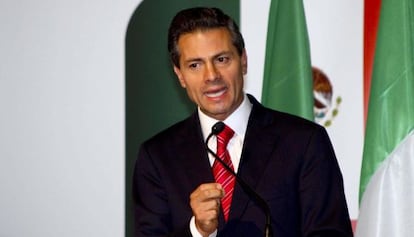PRI retains control of Mexico’s lower chamber with support from its allies
Conservative PAN and leftist PRD parties suffer worst midterm defeats in over 20 years


President Enrique Peña Nieto’s Institutional Revolutionary Party (PRI) will become the dominant force in Mexico’s Chamber of Deputies with support from its two political allies, according to preliminary race results from the June 7 midterm elections.
Although the PRI lost 11 of the 214 seats it had previously held in the 500-member body, the National Electoral Institute (INE) estimates that it will retain control of the chamber with 260 seats by joining forces with the Ecologist Green Party of Mexico (PVEM) and New Alliance Party (PANAL).
The final election race results will be announced in July
Mexican voters gave the PVEM greens 47 seats – 20 more than the amount it had previously held in the lower chamber.
The INE will confirm the preliminary estimates late next month after it recounts votes in a host of race-result challenges filed by different parties in different states across the country.
The PRI was able to survive what had been expected to be a punishment vote aimed against Peña Nieto’s policies, including the privatization of education and reopening the energy sector to foreign investment.
At the same time, his administration has been under fire for the way it handled an investigation into the kidnapping and massacre of 43 teaching students in Iguala, Guerrero state, last September, and for a scandal involving a controversial property deal with links to first lady Angélica Rivera.
The campaign was marred by violence in some areas, with at least nine candidates running in local elections murdered.
With just the votes from PVEM, the PRI will be able to pass legislation without the help of the PANAL – a political force that was organized following the president’s controversial educational reform that broke the control of the powerful SNTE teachers union in the school system.
The main opposition National Action Party (PAN) did badly by winning only 108 seats, its worst result since 1994.
Similarly, Mexico’s third political force, the leftist Democratic Revolution Party (PRD), suffered its worst defeat since 1991 by only retaining 56 of the 99 seats it had held in the chamber.
A big chunk of the leftist vote went to Morena, a new party formed by former PRD presidential candidate Andrés Manuel López Obrador, who is expected to run again in 2018.
Morena, which is expected to win 35 seats, makes its debut in Congress as the fourth-biggest political force.
PAN and PRD held ineffective and weak campaigns, say analysts
Analysts have blamed the PAN and PRD’s poor performances on the ineffective and weak campaigns they organized in the states that were also holding midterms, while the PRI – which had governed Mexico for more than 70 years before it lost to the PAN in 2000 – was able to once again put its strong electoral machine into action.
Meanwhile, a fight is expected for control of the conservative PAN before the next general election. The party is led by Margarita Zavala, the wife of former President Felipe Calderón (2006-2012).
Voter participation was listed at 47.7 percent – the highest for a midterm election since 1997.
Elections for the 128-seat Senate will not be held until 2018.
Tu suscripción se está usando en otro dispositivo
¿Quieres añadir otro usuario a tu suscripción?
Si continúas leyendo en este dispositivo, no se podrá leer en el otro.
FlechaTu suscripción se está usando en otro dispositivo y solo puedes acceder a EL PAÍS desde un dispositivo a la vez.
Si quieres compartir tu cuenta, cambia tu suscripción a la modalidad Premium, así podrás añadir otro usuario. Cada uno accederá con su propia cuenta de email, lo que os permitirá personalizar vuestra experiencia en EL PAÍS.
¿Tienes una suscripción de empresa? Accede aquí para contratar más cuentas.
En el caso de no saber quién está usando tu cuenta, te recomendamos cambiar tu contraseña aquí.
Si decides continuar compartiendo tu cuenta, este mensaje se mostrará en tu dispositivo y en el de la otra persona que está usando tu cuenta de forma indefinida, afectando a tu experiencia de lectura. Puedes consultar aquí los términos y condiciones de la suscripción digital.








































